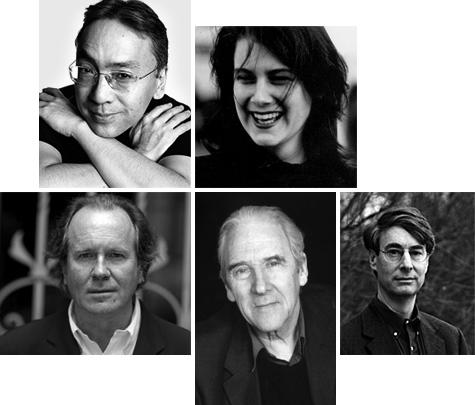
What books published in the past 10 to 15 years might still be read a century from now? The first to come to mind are those both critically acclaimed and massively popular, like White Teeth and Atonement. And I’ll be happy if those novels are still read in 2110. But posterity is a slow game. Some books now considered canonical were largely ignored (or roundly criticized) when first published.
I asked several contributors to think of books that fit this mold: Not on the front page now, but built to last. Their answers include two sprawling novels about the lives of average men, a book that’s out of print in its author’s home country, and works by authors famous for other titles.
Please share your own choices for books that have been neglected (or just under-appreciated) that you think may be read a century from now. You can do so in the comments section of this blog post. Now, on to the list:
It’s All Right Now by Charles Chadwick
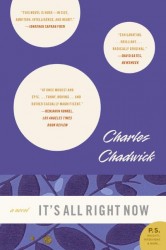 I don’t know any book in the past decade that was more unjustly overlooked than this debut novel by Chadwick, who was 72 at the time. (Disclosure: I played a small role in the book’s U.S. publication.) It was written, Chadwick said, “over thirty years in four installments.” During that time, the author worked for the British government in London, Kenya, Nigeria, Brazil, Canada, and Poland, among other places. The protagonist of his novel, Tom Ripple, rarely travels anywhere.
I don’t know any book in the past decade that was more unjustly overlooked than this debut novel by Chadwick, who was 72 at the time. (Disclosure: I played a small role in the book’s U.S. publication.) It was written, Chadwick said, “over thirty years in four installments.” During that time, the author worked for the British government in London, Kenya, Nigeria, Brazil, Canada, and Poland, among other places. The protagonist of his novel, Tom Ripple, rarely travels anywhere.
On the one hand, Ripple’s ruminations, which last nearly 700 pages, are of the mundane variety that get characters labeled Everyman. They concern his wife, his children, his job, his neighbors, his taste in books and movies, his love of puns. And yet in their number and their accumulated complexity, these thoughts also do what so much great (and enduring) fiction does, which is obliterate the very idea of the Everyman, proving that each individual life, if observed closely enough—and for long enough—is unlike any other.
It’s All Right Now wasn’t ignored altogether. David Gates, reviewing it for Newsweek, said: “No writer—no writer—has ever been more scrupulous in honoring his characters’ complexity, in distinguishing who they sometimes appear to be from who they sometimes are.” In a review in the Los Angeles Times, Benjamin Kunkel called Ripple “one of the most vivid and robust characters in recent British fiction” and described the novel as “[a]t once modest and epic.” But the otherwise silent response it received was much less than the accomplishment deserved. Here’s one of my favorite passages from the book—indicative of the empathy and plainspoken beauty throughout—in which Ripple recalls his boyhood:
My father used to sneak off to church sometimes, leaving his account books spread across the kitchen table as if to find something that added up for a change. So he knew the tunes even if he couldn’t sing them, or only in throaty snatches. My mother stared ahead of her, grimly silent, as if she knew them only too well. The last hymn was about fighting the good fight. I remember that because my father sang loudly then as if suddenly reminded that courage was something he’d forgotten to tell me about.
—John Williams
*****
Should You Leave? by Peter D. Kramer
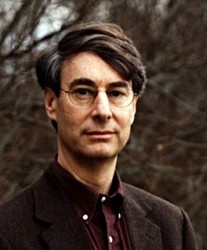 Should You Leave?, Peter D. Kramer’s quiet follow-up to his 1993 bestseller, Listening to Prozac, belongs to the genre of self-help, a kind of writing that I suspect won’t offer much to readers a hundred years from now. There are deep as well as superficial reasons for this. Yes, the books are bad. But worse, they misconstrue their enterprise. The true cry of the advice-seeker is not, “What are the guidelines of conduct that my culture would have for me?” but rather, “Do the guidelines pertain to me now?” The first is a factual matter, the second an ethical one. The first is historical, the second timeless. Self-help books offer clear answers, but to the wrong question. It’s imaginative literature that speaks to the urgent query—but only obliquely, and with ambiguity. Fiction is relevant but a poor guide to action. Self-help is the opposite: practical but beside the point.
Should You Leave?, Peter D. Kramer’s quiet follow-up to his 1993 bestseller, Listening to Prozac, belongs to the genre of self-help, a kind of writing that I suspect won’t offer much to readers a hundred years from now. There are deep as well as superficial reasons for this. Yes, the books are bad. But worse, they misconstrue their enterprise. The true cry of the advice-seeker is not, “What are the guidelines of conduct that my culture would have for me?” but rather, “Do the guidelines pertain to me now?” The first is a factual matter, the second an ethical one. The first is historical, the second timeless. Self-help books offer clear answers, but to the wrong question. It’s imaginative literature that speaks to the urgent query—but only obliquely, and with ambiguity. Fiction is relevant but a poor guide to action. Self-help is the opposite: practical but beside the point.
Kramer, whose book seeks to counsel the individual who is torn between staying in or leaving a marriage or partnership, is mindful of these limitations. He struggles too against another constraint: the aversion of his profession, psychotherapy, to the giving of advice. “There are few things that I think are so harrowing,” the psychiatrist Harry Stack Sullivan once said, “as the occasional psychiatrist who knows a great deal about right and wrong.” Growth, not wisdom, is the traditional aim. Still, Kramer is tempted to give advice a try. Emboldened by an occasion or two outside of the consulting room in which he was able to provide swift, immediate help, and sensing that advice is not a straightforward affair, he ends up going ahead, albeit unconventionally, producing a strange amalgam of self-help, fiction, and nonfiction.
Much of the book is written in the second person, the idiom of advice. But rather than target some generalized “you,” Kramer addresses a series of fictional characters, whose predicaments the reader is forced, by virtue of the pronoun, somewhat uneasily to inhabit (much like in Italo Calvino’s novel If on a winter’s night a traveler or Lorrie Moore’s story collection Self-Help). Along the way, Kramer introduces and discusses the writings, mostly overlooked today, of a series of mid-century psychotherapists—Murray Bowen, Henry Dicks, Helmuth Kaiser, Harry Stack Sullivan—whose theories have much to say about the nature of relationships (and many of whose insights, Kramer notes with irony, now reappear in crude form in today’s self-help books). Kramer applies steady critical pressure to his own effort throughout, so that Should You Leave? also serves as a meditation on the nature of advice itself. The result is an oddly compelling book, one that by dismantling the conventions of its genre presents a worthwhile and—perhaps—lasting example of it.
—James Ryerson
*****
The Unconsoled by Kazuo Ishiguro
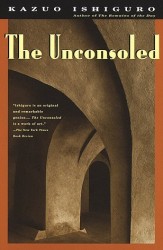 Blame the butler. After writing a pair of novels about repressed old Japanese people, Kazuo Ishiguro, born in Japan but raised in Britain from the age of six, shifted his setting west, to wartime Britain, and chose as his protagonist a repressed old Briton, Stevens the butler. The Remains of the Day got Ishiguro Bookered and Merchant-Ivoried. Everybody loves a wistful old windbag, but in writing Stevens, Ishiguro had become so proficient at it that there was nowhere else to go. His previous two novels had concerned similar Japanese characters: Etsuko in the slight A Pale View of Hills and Masuji Ono in the underrated An Artist of the Floating World. Readers’ appetites for such characters may be insatiable (hello, Masterpiece Theatre), but authors are only human; they do get bored.
Blame the butler. After writing a pair of novels about repressed old Japanese people, Kazuo Ishiguro, born in Japan but raised in Britain from the age of six, shifted his setting west, to wartime Britain, and chose as his protagonist a repressed old Briton, Stevens the butler. The Remains of the Day got Ishiguro Bookered and Merchant-Ivoried. Everybody loves a wistful old windbag, but in writing Stevens, Ishiguro had become so proficient at it that there was nowhere else to go. His previous two novels had concerned similar Japanese characters: Etsuko in the slight A Pale View of Hills and Masuji Ono in the underrated An Artist of the Floating World. Readers’ appetites for such characters may be insatiable (hello, Masterpiece Theatre), but authors are only human; they do get bored.
And so, for his fourth novel, Ishiguro went nuts. The Unconsoled is part horror, part thriller, part comedy of manners. Ryder, a British pianist, is plonked down in a central European city, where he is due to give a recital, and where he finds he knows everything and nothing, everyone and no one. From the opening sentence—“The taxi driver seemed embarrassed to find there was no one—not even a clerk behind the reception desk—waiting to welcome me”—everything becomes slippery. In short order, Ryder comes to form a bond with a child who appears to be his own; he comes to fulfill every expectation of a town council and a dowager who are either insistent and lunatic or familiar and rightly annoyed; he finds himself embroiled in an adventure at once dull, ordinary, and entirely insane. The novel is indigestible, uncanny, unsettling, laughable, and a masterpiece.
—Jon Fasman
*****
The Ax by Donald E. Westlake
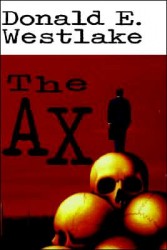 When people look back at this moment in American life a century from now, what will they consider its most salient aspect? A few years ago, most people would have said terrorism and its aftermath. But now it seems more likely to be remembered as a brutal stretch of the decades-long unraveling of the widely shared prosperity and economic security of the postwar boom.
When people look back at this moment in American life a century from now, what will they consider its most salient aspect? A few years ago, most people would have said terrorism and its aftermath. But now it seems more likely to be remembered as a brutal stretch of the decades-long unraveling of the widely shared prosperity and economic security of the postwar boom.
I know of no book that maps the landscape of financial insecurity as unflinchingly as Donald E. Westlake’s The Ax. Published in 1997, as corporations were shedding jobs by the thousands even in the midst of good economic times, it has only become more chilling in the decade since. It’s a crime novel, but the murders at its heart are only the most obvious of the crimes it depicts, set as they are against the deteriorating relationship between individual workers and the faceless corporate powers that determine their destiny.
The Ax tells the story of Burke Devore, a former line manager at a paper company who was laid off after a twenty-five-year career when the company was bought and the plant closed. For more than two years since, he’s been trying to get a job, suffering through the indignities of rejection and condescending retraining courses, to no avail. As the book opens he’s decided on a radical plan: to find a job he wants and then kill off the competition. Having collected a flood of resumes through a fake help-wanted ad, Devore sets out to murder the six men he judges most likely to be hired ahead of him. It’s not easy, and it’s far from clean—in fact, the murders get downright gruesome—but he attacks the problem with the unflagging determination of a man who sees no other way out:
I’m not a killer. I’m not a murderer, I never was, I don’t want to be such a thing, soulless and ruthless and empty. That’s not me. What I’m doing now I was forced into, by the logic of events; the shareholders’ logic, and the executives’ logic, and the logic of the marketplace, and the logic of the workforce, and the logic of the millennium, and finally by my own logic.
Though he seems utterly normal in many ways—he loves his wife and son, and fears for their future—Devore is obviously sick, his flat affect carrying shades of Patricia Highsmith’s or Jim Thompson’s sociopaths. Nonetheless, as he worries and rages and laments being, as he sees it, thrown away by society when he is still willing and able to work, we don’t have any answers to offer him. Of course he shouldn’t kill, but as the welter of hopelessness spreads wider and wider through all reaches of the economy, it becomes ever more difficult to say what Devore should do. The result is a novel so grim—and so relevant—that it’s almost painful to read.
—Levi Stahl
*****
Human Smoke by Nicholson Baker
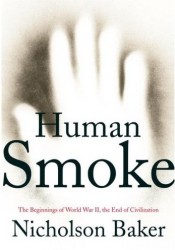 In Human Smoke, Nicholson Baker uses diary entries, newspaper reports, speeches, and official papers to attempt to overturn some preconceptions about the Second World War. The presentation is notable: one or two discrete paragraphs per page, ample white space surrounding them, each block of text containing a clinically related fact.
In Human Smoke, Nicholson Baker uses diary entries, newspaper reports, speeches, and official papers to attempt to overturn some preconceptions about the Second World War. The presentation is notable: one or two discrete paragraphs per page, ample white space surrounding them, each block of text containing a clinically related fact.
Baker presents the facts blankly, but he has carefully chosen which ones to include, and he has a message to convey: that England and America were not dragged unwillingly into war. The suggestions that Baker’s facts communicate—hypnotically, like an incantation—are that in the 1930s and 40s, America was intent on flexing its muscles against Japan, with ostentatious displays of military might in China and the Pacific; and that Winston Churchill was itching for another battle with Germany and, like Bush in Iraq, had already determined that it would happen long before the ostensible casus belli arose. (The Prime Minister of Australia observed that Churchill “positively enjoys the war.”)
Baker does not seek to overturn basic truths, such as the barbarism of Nazi Germany, and its express ambition to “destroy and exterminate the Polish people,” though Churchill himself, like Eleanor Roosevelt, expressed the casual anti-Semitism of the times, and it seems that the only people who gave a damn about Jewish refugees (“refugees,” one commentator notes, was not the right word, as they had no refuge to go to) were the pacifists.
The question must be whether Baker’s meticulously researched text (there are around 1,500 references) amounts to propaganda in itself. Would pacifism, if practiced by the allied governments, have had the effect that Aldous Huxley anticipated in 1937? In any case, I don’t think one has to agree with everything Baker wants to put across in order to admire this book. Given the enduring interest in the Second World War, this is a book—and a debate—that will likely linger.
—John Self
*****
Oh Pure and Radiant Heart by Lydia Millet
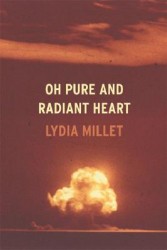 It might be damning with faint praise to say that Oh Pure and Radiant Heart is the funniest novel ever written about the scientists behind the Manhattan Project. So let’s go with this: It’s one of the most affecting novels I’ve read about the nuclear age, a vastly underappreciated triumph of American fiction. And though it is funny, Lydia Millet never sacrifices the seriousness of the subject for the sake of a joke.
It might be damning with faint praise to say that Oh Pure and Radiant Heart is the funniest novel ever written about the scientists behind the Manhattan Project. So let’s go with this: It’s one of the most affecting novels I’ve read about the nuclear age, a vastly underappreciated triumph of American fiction. And though it is funny, Lydia Millet never sacrifices the seriousness of the subject for the sake of a joke.
“Serious” might not be the first word that comes to mind when you hear the plot: Physicists J. Robert Oppenheimer, Enrico Fermi, and Leó Szilárd wake up in 2003 in Santa Fe. The last thing they remember is the now-iconic mushroom cloud produced by the Trinity test near Alamogordo in 1945. The scientists are taken in by a librarian and her incredulous husband, and a bizarre road trip for the sake of nuclear disarmament ensues. Add to that marital troubles, weirdly earnest (even for hippies) hippies, and Christian fundamentalists, and you’ve got a narrative that sounds nearly impossible to sustain. But Millet somehow pulls it off, juggling themes of alienation, displacement, war and peace, love and fear, without a false step. The language is beautiful; the dialogue is by turns hilarious and touching, and never less than realistic.
Published in 2005 by indie Soft Skull Press, the novel never got the full attention it deserved. That’s a shame, but Millet, I feel, will be vindicated—the world isn’t getting any less scary, and this novel speaks perfectly to both our worst apocalyptic fears and our most ambitious feelings of hope and community. As the director of the Trinity test said to Oppenheimer after the explosion, “Now we are all sons of bitches.” We still are, of course, but in this book Millet suggests it doesn’t have to be that way forever. She sure as hell convinced me.
—Michael Schaub
*****
William James: In the Maelstrom of American Modernism by Robert D. Richardson
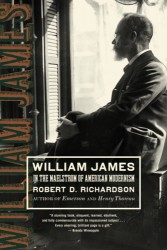 Reading William James’ The Varieties of Religious Experience gave me the strange sensation of discovering not just a favorite book but a new friend. The text was originally delivered as a series of lectures, but James is equally clear and approachable, bracing and consoling in all of his writings. Varieties will be read for as long as there is literacy, and I imagine its spirited voice will always send a certain number of its readers in search of more information about James and his life. Richardson’s biography is the first place they should run to.
Reading William James’ The Varieties of Religious Experience gave me the strange sensation of discovering not just a favorite book but a new friend. The text was originally delivered as a series of lectures, but James is equally clear and approachable, bracing and consoling in all of his writings. Varieties will be read for as long as there is literacy, and I imagine its spirited voice will always send a certain number of its readers in search of more information about James and his life. Richardson’s biography is the first place they should run to.
Appropriately, given the liveliness of his subject, Richardson eschews the common, dry strategy of starting a bio with ancient ancestors. In fact, the book opens on James at 64 years old, awoken by the great San Francisco earthquake of 1906. (He was teaching at Stanford at the time.) It’s a brief prologue, and the perfect introduction to someone who believed strongly in the importance of first-hand experience.
James was prone to melancholy, suffering through a severe depression in his mid-20s and several more episodes throughout his life. But he also hummed with boyish energy, “took stairs two or three at a time until he was past fifty,” and “willed himself into being a positive, upbeat, forward-looking person.” His contradictions, and the brilliant, often funny way he had of describing them (along with most other facets of human experience) make him an ideal, quotable subject. Richardson is a first-rate biographer, gracefully making room for the considerable number of historical moments, intellectual currents, and famous friends that crowded the philosopher’s life. His book is a treasure because it wells over with the qualities that James possessed: “the scorching directness, the emotional candor, the acceptance and validation of the worst as well as the best of life, the sheer intensity toward life in all its forms, the avidity for experience, the honesty of mind and perfect pitch of heart.”
—John Williams
*****
Any Human Heart by William Boyd
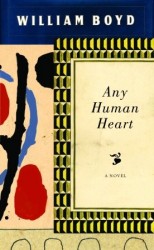 Regarding and trying to explain an entire life at arm’s length is like trying to do the same for a span of time—say, a century. You can list the highs and lows, define politics and trends, but in the end they need context if they’re going to make any sense at all.
Regarding and trying to explain an entire life at arm’s length is like trying to do the same for a span of time—say, a century. You can list the highs and lows, define politics and trends, but in the end they need context if they’re going to make any sense at all.
William Boyd’s novel Any Human Heart presents us with the journals of Logan Mountstuart, who was born in Montevideo, Uruguay, in 1906, and died in Saint-Sabine, France, in 1991. Mountstuart isn’t a hero, or even anything as forceful as an antihero. Events large and small just happen to him. The list of notable people he encounters—Ernest Hemingway, the Duke of Windsor and Mrs. Simpson, Pablo Picasso, Ian Fleming, a sharp-tongued Virginia Woolf—is sometimes fantastic but never gimmicky. And through it all, Mountstuart is actually a bit of a shit—self-centered, self-indulgent, shortsighted. In other words, average. He’s moderately well-bred, leaves Oxford with an unimpressive third in History, and never quite realizes his potential as a writer. He gets one stab at true love and happiness, and once that’s taken from him his relationships are generally messy and short-lived.
Yet when viewed as a whole, from start to finish, his life is a thing of striking beauty. Not because of its star-studded cast or exotic locales, but simply because it’s a life. Boyd deftly paints a portrait of a flawed man in a flawed time, with deadpan affection. Mountstuart begins his journals as a pompous 17-year-old, restless and in love with his own voice, and he ends them an old man, humbled and serene, “pleased to have managed to live in every decade of this long benighted century.” And while that’s true—Mountstuart is a 20th-century man if ever there was one—by making him so resolutely a product of his time, Boyd also manages to make him one for the ages.
—Lisa Peet
*****
Dr. Haggard’s Disease by Patrick McGrath
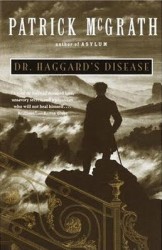 Patrick McGrath is wildly popular in other countries—in Italy, his most celebrated novel, Asylum, has sold almost a million copies—but somewhat neglected in his own. (Jonathan Coe, a Booker judge in 1996, now regrets that the prize didn’t go to Asylum.) Most of his novels are out of print in the UK, including the one I consider to be his best, Dr. Haggard’s Disease.
Patrick McGrath is wildly popular in other countries—in Italy, his most celebrated novel, Asylum, has sold almost a million copies—but somewhat neglected in his own. (Jonathan Coe, a Booker judge in 1996, now regrets that the prize didn’t go to Asylum.) Most of his novels are out of print in the UK, including the one I consider to be his best, Dr. Haggard’s Disease.
Here is a novel that combines so many of my favorite things: stylistic brilliance, unreliable narrative, psychological acuity, and a smoky, glassy between-the-wars English setting. Dr. Edward Haggard has retired to the south coast to practice general medicine and lick the wounds of a failed love affair. But the love affair will not let him go, and he creates a religion of his passion (“I should have thought that passion, at least, was about pleasure?”)—with biblical language to match—and when the son of his lost lover turns up, it finds a new and horrible manifestation. Soon we are “in the light of a burning spitfire,” and the terrible coup of the ending is upon us (“Don’t move, darling boy. Don’t fight it.”) One of the finest things about Dr. Haggard’s Disease is that the end is right there from the beginning—we are careering toward it in Haggard’s doubtful company—and so there is none of the middle-of-the-story dawdling that longer books can give us (it clocks in at just 180 pages).
McGrath has previously reported himself a fan of Nigel Balchin’s 1942 novel Darkness Falls from the Air, which he describes as having “the most perfect ending of any story I’ve ever read.” In fact, I think the ending of Dr. Haggard (which owes something to the Balchin) far superior. It is a tender, grotesque, barking mad masterpiece.
—John Self
*****
About the contributors: Jon Fasman is the author of the novels The Geographer’s Library and The Unpossessed City
. . . . Lisa Peet is the founder of the literary blog Like Fire. . . . James Ryerson is an editor at the New York Times Magazine. . . . Michael Schaub is the managing editor of Bookslut. . . . John Self writes about books at Asylum. . . . Among many other things, Levi Stahl blogs at I’ve Been Reading Lately. . . . John Williams is the editor of The Second Pass.

